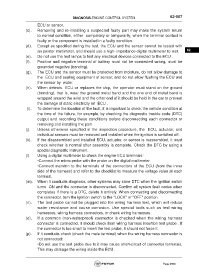Page 2559 - Foton Workshop Manual - Sauvana
P. 2559
DIAGNOSIS-ENGINE CONTROL SYSTEM 62-507
ECU or sensor.
(c). Removing and re-installing a suspected faulty part may make the system return
to normal condition, either completely or temporarily, when the terminal contact is
faulty or the component is installed in a faulty condition.
(d). Except as specified during the test, the ECU and the sensor cannot be tested with
an pointer multimeter, and should use a high- impedance digital multimeter to test. 62
(e). Do not use the test lamps to test any electrical devices connected to the ECU .
(f). Positive and negative terminal of battery must not be connected wrong, must be
grounded negative (bonding).
(g). The ECU and the sensor must be protected from moisture, do not allow damage to
the ECU and sealing equipment of sensor, and do not allow flushing the ECU and
the sensor by water.
(h). When detects ECU or replaces the chip, the operator must stand on the ground
(bonding), that is, wear the ground metal band and the one end of metal band is
wrapped around the wrist and the other end of it should be held in the car to prevent
the damage of static electricity on ECU .
(i). To determine the location of the fault, it is important to check the vehicle condition at
the time of the failure, for example, by checking the diagnostic trouble code (DTC)
output and recording these conditions before disconnecting each connector or
removing and installing the part.
(j). Unless otherwise specified in the inspection procedure, the ECU, actuator, and
individual sensors must be removed and installed when the ignition is switched off.
(k). If the disassembled and installed ECU, actuator, or sensor is reassembled, it must
check whether is normal after assembly is complete. Check the DTC by using a
special diagnostic instrument.
(l). Using a digital multimeter to check the engine ECU terminals:
•Connect the micro-probe with the probe on the digital multimeter.
•Connect mandrin to the terminals of the connectors of the ECU (from the inner
side of the harness) and refer to the checklist to measure the voltage value at each
terminal.
(m). When it conducts diagnosis, other systems may store DTC when the ignition switch
turns ON and the connector is disconnected. Confirm all system fault codes when
completes If there is a DTC, delete it entirely. When connecting and disconnecting
the connector, turn the ignition switch to the "LOCK" or "OFF" position.
(n). The test probe cannot be plugged into the wiring harness test, which will reduce
water resistance and cause corrosion. Use special tools such as test wiring
harnesses, wiring harness connectors, or check wiring harnesses.
(o). If a common (non-waterproof) connector is checked when the wiring harness
connector is connected, it should check from wiring harness insertion test probe . If
the connector is too small to insert the test probe, it should not force it.
(p). If it conducts check (check the male terminal) when the wiring harness connector is
not connected:
•Do not use the test probe due to it may cause short-circuit of connector terminals.
This may damage the wiring inside the ECU .
Page 2559

